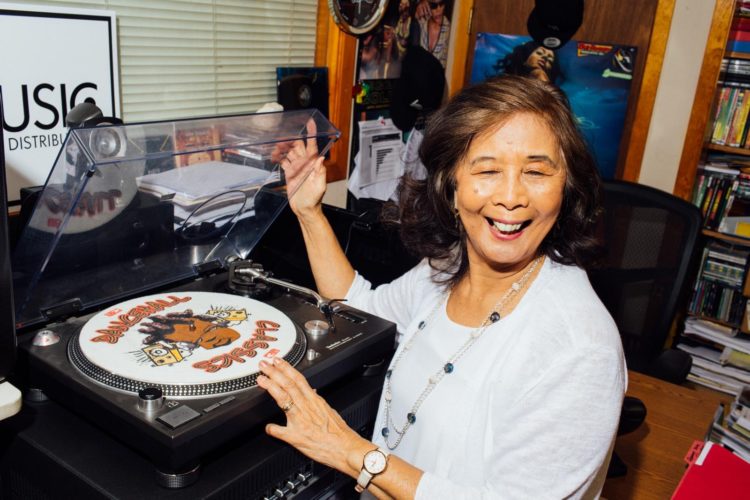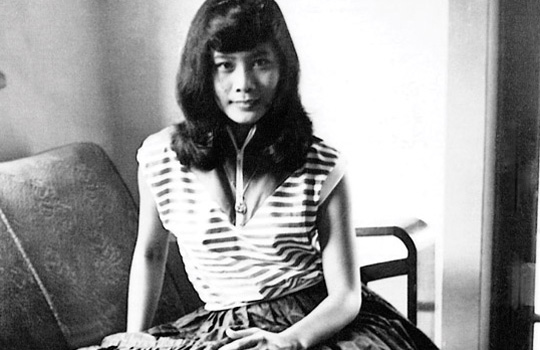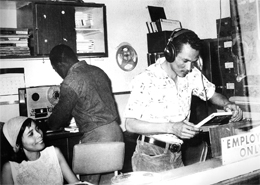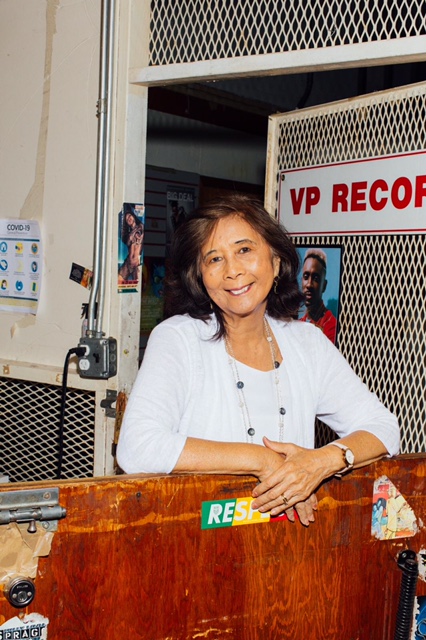VP Records co-founder and reigning real Queen of the Dancehall and matriarch of Reggae music, Patricia “Miss Pat” Chin, continues to lead the largest independent Reggae label and distributor of Caribbean music.
Enjoy this excerpt from her forthcoming energetic and very engaging autobiography, where she talks about her family history, sound system culture, the start of Randy’s Records in Kingston, Jamaica with her late husband Vincent “Randy” Chin, and of course her seminal role in the founding of VP Records. (VP stands for Vincent and Pat.)
“I wrote this book for my grandchildren and future generations to know who I am,” says the author, Miss Patricia Chin, a Jamaican born to a Chinese mother and an Indian father. “Had it not been for my loving family, and all my friends and associates that encouraged me, this book would not have been written. I hope that readers will discover that with hard work and consistency, good things can happen. Nothing is impossible.”

Anicée Gaddis, the New York-based writer who worked with the author on the autobiography, says “Miss Pat is an iconic symbol surrounding the genesis, progression and current state of Reggae. The fact that her vision was able to transcend and transform popular culture speaks volumes about her passion, her drive and her ability to turn a personal dream into a major cultural platform that continues to leave its resounding stamp on the world stage.”
Here is an excerpt.
As the music grew more and more fascinating, so did my appreciation and genuine love for it. I particularly enjoyed the humor in some of those records as well. Some like Prince Buster could be potentially controversial. He did songs like “Black Head Chinaman,” a song that would prompt harmless chuckling in the Caribbean, but raise eyebrows elsewhere. In the spirit of playful bantering, something that Caribbean people are known for, Prince Buster and Derrick Morgan would even sing songs about each other.
I was always interested in how the lyrics translated their feelings. While it was never usually about anything too serious, you did have the occasional fuss. Take Prince Buster and Beverley’s, for instance. They had a little tension going on because Derrick Morgan used to sing for Prince Buster before going to Beverley’s, so there was a war of words between them through lyrics.

In many ways the music was like a newspaper—and even our pre-Internet social media. You could learn what was going on in the country just by listening to the music. Sometimes the messages were strong ones—like “Why don’t you put away your guns?” And, of course, sometimes they were just a whole lot of fun.
Meanwhile, the industry continued to challenge my skills as a businesswoman as well as my knowledge of music. Determined to stay at the top of my game, I sharpened my skills with on-the-job practice. For instance, the prerelease of 45s was a supply-and-demand practice that kept me busy with our bookkeeping.
Typically, the 45s would be sold first at the higher prerelease price for two to three weeks to the sound system guys. They had one goal in mind: to have the best and most recent releases. Once the competition with their rivals was over, we would drop the price for the general public.

I also had to be quick on my feet—literally. Sales could really get hectic at Randy’s when the music was being played. Customers would hear it and rush the counter wanting to buy ten or so. I developed and honed my A&R skills from behind the counter at Randy’s, where I would play test pressings from our upstairs Studio 17, in order to gauge customers’ reactions. This interaction with my customers helped me to decide which tracks to release. I also had to be a walking encyclopedia of music. Sometimes customers would come in without knowing the name of a song they had in mind. “Mi want some music but mi nuh know di name a di tune, Miss Pat.” But that never stumped me. “Hum it for me,” I’d tell them. Without fail I would find the song. This happened with the famous selector Tony Screw—a.k.a. Downbeat The Ruler—who came in one day looking for a specific remix of John Holt’s “Stick By Me” hit. “Mi check all di stores uptown and downtown,” he said, “and walk all over Orange Street. But dem eedah don’t have it or don’t know it!” He really needed it, he said, for an upcoming clash. The problem was, because the labels had been scratched off, he didn’t know the song’s name. So I told him to hum it for me. After a few minutes of searching, I handed him the elusive record with a huge smile, happy that I had found it. “Here it is!” He was so thrilled he burst out laughing. “Miss Pat! Miss Pat, yuh di don! If anyone else comes in here asking for it, tell dem yuh don’t have it.”
As we evolved in the industry, my ear became sharper. Just as I had learned something new, the record producers would come up with new ideas and sounds. But that didn’t deter me. I soon learned to tell the different labels apart just from the sound, without even seeing the label itself. Let me tell you—I was having a blast and seizing every opportunity to learn as much as I could from anyone who would teach me.
Duke Reid was one of those who entertained all my questions. He was someone I rated highly, as evidenced from the amount of his records we used to buy from him for our shop. I never did meet him in person, but we’d have long conversations on the phone about music and the music business.
An ex-policeman who had a haberdashery and liquor store with a studio above it, his persona was large. I never saw this for myself, but rumor had it that he would wear a crown on his head and let fans carry him into the dancehall on their shoulders. From his pictures I could tell that he was a large man which may have been the reason some people feared him, especially given the fact that he did business in rough areas. But I thought he was just a really nice person, and recording artists in general felt that he treated them fairly.
I also consider Duke Reid and Coxsone Dodd of Studio One to be among Jamaica’s greatest producers. Proof is the fact that their songs are being played even today. They took a chance on young artists at a time when it was risky, risky because we didn’t really have something called Jamaican music. Without pioneering producers like these, we wouldn’t be here today. Their vision and passion helped to give the country its own musical legacy.
Reserve your copy at vpreggae.com and look for “Miss Pat: My Reggae Music Journey.”

